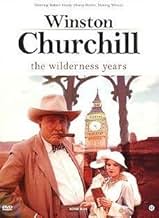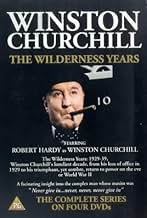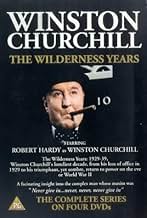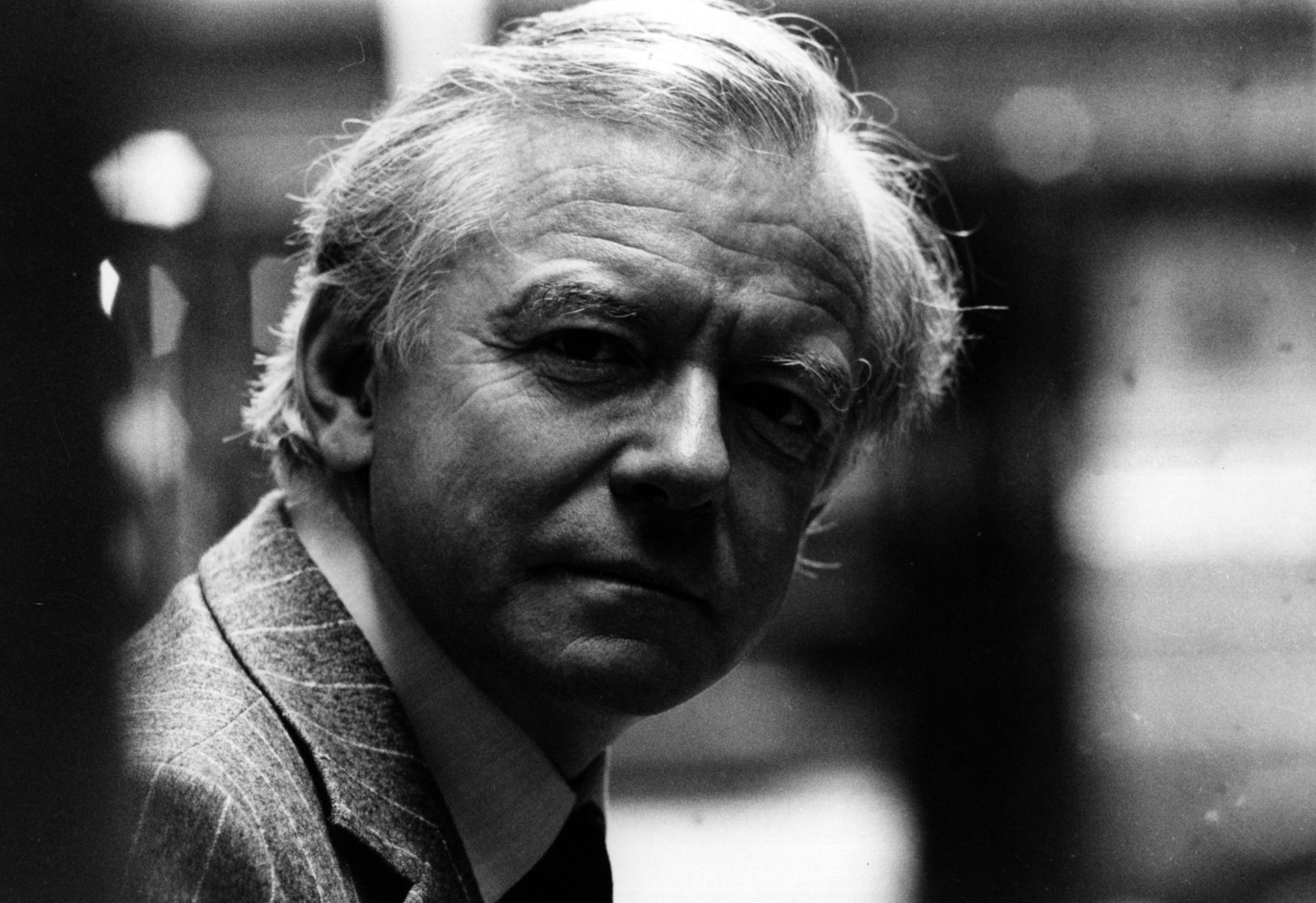अपनी भाषा में प्लॉट जोड़ेंThe story of Winston Churchill's life between 1929, when he lost his cabinet position, and 1939, when he joined Great Britain's War Cabinet - a period he described as the most difficult in h... सभी पढ़ेंThe story of Winston Churchill's life between 1929, when he lost his cabinet position, and 1939, when he joined Great Britain's War Cabinet - a period he described as the most difficult in his life.The story of Winston Churchill's life between 1929, when he lost his cabinet position, and 1939, when he joined Great Britain's War Cabinet - a period he described as the most difficult in his life.
- 8 BAFTA अवार्ड के लिए नामांकित
- 1 जीत और कुल 8 नामांकन
एपिसोड ब्राउज़ करें
फ़ीचर्ड समीक्षाएं
Robert Hardy is the most convincing imitator of Churchill I've seen. He is wisely depicted here with his foibles - his rashness and ineptitude in areas beyond his ken, such as the stock market and raising offspring - as well as strengths. And it's a treat to see Siân Phillips and Tim Pigott-Smith supporting.
Here's a story well-told, with interesting locations, too, from Churchill's home at Chartwell, in UK, to the Arizona desert. For anyone with an appreciation of the titanic events that shaped World War II, "The Wilderness Years" provides invaluable background, not only for Churchill as a major player, but for the others - Baldwin, Beaverbrook, Chamberlain, as well as movers and shakers with unfamiliar names, like the oily Sir Samuel Hoare, who manipulated and connived on behalf of appeasement.
Despite the mediocre print I highly recommend "The Wilderness Years" as an enriching docudrama that deserves repeated viewing. My only regret is, that Robert Hardy did not continue the Churchill saga through the war years. What a smashing tale that would have been!
Here's a story well-told, with interesting locations, too, from Churchill's home at Chartwell, in UK, to the Arizona desert. For anyone with an appreciation of the titanic events that shaped World War II, "The Wilderness Years" provides invaluable background, not only for Churchill as a major player, but for the others - Baldwin, Beaverbrook, Chamberlain, as well as movers and shakers with unfamiliar names, like the oily Sir Samuel Hoare, who manipulated and connived on behalf of appeasement.
Despite the mediocre print I highly recommend "The Wilderness Years" as an enriching docudrama that deserves repeated viewing. My only regret is, that Robert Hardy did not continue the Churchill saga through the war years. What a smashing tale that would have been!
Very accurate telling of Churchill's life while out of office and his struggle to warn the UK of the Nazi peril. Hardy puts his soul into it, though he comes off as whiny or pouting at times rather than as the British bulldog Churchill was. Fascinating stuff!
10sissoed
I was very impressed by this film when it was broadcast in the 1980s, and have watched it many times since buying it on DVD. Robert Hardy's portrayal of Churchill is masterful, passionate, convincing, and authentic.
But what especially makes this one of the best-ever historical dramatizations are the performances of the other key actors: the men who portray Churchill's political colleagues and competitors. Edward Woodward, portraying Samuel Hoare, presents such a mixture of personal ambition, policy idealism, and jealousy that you feel you are experiencing a real human being, not a caricature that is simply performing a role to make a dramatic conflict with the main character.
The same is true of the other key roles. Peter Barkworth as Prime Minister Stanley Baldwin presents a calculating but tactful politician. Eric Porter as Neville Chamberlain is a compelling performance of a man so focused on the pursuit of peace and economic well- being at home that he deceives himself as to Hitler and the Nazis' true character.
Without exception, there are no stereotypes, no simplistic characters, presented here. All of Churchill's opponents are good men, dedicated to the peace and prosperity of the British people, whose flaw is that they are so dedicated to that cause that they deceive themselves regarding the character of Hitler.
Indeed, in many ways, after researching the history of the subjects covered, I grew to like Churchill's opponents almost as much as I like Churchill. A major sequence in this film focuses on India where the supposed "villain," Samuel Hoare, is working overtime to achieve a reform bill for India that gives greater freedom and self-government to the Indian people, in part by removing a restrictive trade law that gave Manchester cotton-men a guaranteed market in India. The testimony Hoare suppressed and that Churchill is so keen to expose was in favor of perpetuating protectionism that raised the prices paid by poor Indians. This film ignores this, because it reveals Churchill to be a reactionary anti-free- trade protectionist on this issue. The India bill that Churchill opposed, and that Hoare, Baldwin, and Ramsey Macdonald (also one of the Prime Ministers portrayed) supported was a visionary bill that did honor to the British people, and it has been forgotten only because World War II, and the subsequent Indian independence movement, have buried it under the weight of more significant history. Then later, Hoare becomes one of those who realizes the true character of Hitler, and it is he, not Churchill, who forces Chamberlain to act after the Nazi invasion of Poland. If I were the ghost of Sir Samuel Hoare, I would find this film to be a great vindication.
Churchill as presented here and, I think, in real life was a feeling, but not a calculating, man. Again and again in this film, Churchill due to his good nature is tricked by the deceits of his opponents, to the point that he comes across almost as unintelligent. As Stanley Baldwin puts it at a key point in this film, if Britain went to war, Churchill would be the best choice for Wartime Prime Minister, but in peace, never. There is a fair amount of Churchill idolatry on the conservative side of the American political spectrum, which ought to be tempered with the recognition that a rational and calculating mind is usually what is needed to run a government.
In 1940, after the disaster at Dunkirk, a trio of journalists writing under the pen-name Cato produced a short book, "Guilty Men," that blamed Chamberlain, Baldwin, Hoare, and others for misjudgments and self-interest that led to the "appeasement" policy. The book was hugely popular and has colored the public and academic-historical understanding of the "Wilderness Years" ever since. This film follows the same line, as does the 2007 book "Troublesome Young Men" by Lynne Olson. But as reviewer Andrew Stuttaford wrote in the New York Sun, this view "spared the rest of the British people the embarrassment of asking themselves what exactly they had been doing while the threat from the Third Reich grew. It was, after all, a period in which Britons in their millions had not only participated in 1935's unofficial 'Peace Ballot' (collective security, 'effective' sanctions, you know how it goes), but had also, after three more years of Hitler, taken to the streets to celebrate the deal Chamberlain cut at Munich." And as Evan Thomas wrote in Newsweek (23 June 2008), Franklin Roosevelt's response to Chamberlain's Munich deal was a telegram to Chamberlain saying "good man," and FDR wrote the US ambassador to Italy "I am not a bit upset over the final result."
The lesson of this film is that many of us, when we set out on a career and identify goals that we want to achieve to make great reputations for ourselves, have a tendency to see the other people we encounter in life as having personalities and motivations that will facilitate our getting what we want. As presented here, Baldwin wanted peace and prosperity for Britain, and so he seized on the idea that while Hitler was warlike, Hitler wanted war only with the Soviets, not with the West, so Britain need not fear. His successor, Chamberlain, also wanted peace and prosperity, and knew that he would be thwarted if Hitler really was all-out for war; so he saw Hitler as also being a man who wanted peace and prosperity. Both men gambled on Hitler, and Germany, being a leader and nation that would, due to their own interests and preferences, act in ways that would make it possible for Baldwin and Chamberlain to achieve their own ends. The lesson here for us today is to separate-out from our assessments of foreign leaders the way we hope those leaders are if we are to achieve our own goals.
But what especially makes this one of the best-ever historical dramatizations are the performances of the other key actors: the men who portray Churchill's political colleagues and competitors. Edward Woodward, portraying Samuel Hoare, presents such a mixture of personal ambition, policy idealism, and jealousy that you feel you are experiencing a real human being, not a caricature that is simply performing a role to make a dramatic conflict with the main character.
The same is true of the other key roles. Peter Barkworth as Prime Minister Stanley Baldwin presents a calculating but tactful politician. Eric Porter as Neville Chamberlain is a compelling performance of a man so focused on the pursuit of peace and economic well- being at home that he deceives himself as to Hitler and the Nazis' true character.
Without exception, there are no stereotypes, no simplistic characters, presented here. All of Churchill's opponents are good men, dedicated to the peace and prosperity of the British people, whose flaw is that they are so dedicated to that cause that they deceive themselves regarding the character of Hitler.
Indeed, in many ways, after researching the history of the subjects covered, I grew to like Churchill's opponents almost as much as I like Churchill. A major sequence in this film focuses on India where the supposed "villain," Samuel Hoare, is working overtime to achieve a reform bill for India that gives greater freedom and self-government to the Indian people, in part by removing a restrictive trade law that gave Manchester cotton-men a guaranteed market in India. The testimony Hoare suppressed and that Churchill is so keen to expose was in favor of perpetuating protectionism that raised the prices paid by poor Indians. This film ignores this, because it reveals Churchill to be a reactionary anti-free- trade protectionist on this issue. The India bill that Churchill opposed, and that Hoare, Baldwin, and Ramsey Macdonald (also one of the Prime Ministers portrayed) supported was a visionary bill that did honor to the British people, and it has been forgotten only because World War II, and the subsequent Indian independence movement, have buried it under the weight of more significant history. Then later, Hoare becomes one of those who realizes the true character of Hitler, and it is he, not Churchill, who forces Chamberlain to act after the Nazi invasion of Poland. If I were the ghost of Sir Samuel Hoare, I would find this film to be a great vindication.
Churchill as presented here and, I think, in real life was a feeling, but not a calculating, man. Again and again in this film, Churchill due to his good nature is tricked by the deceits of his opponents, to the point that he comes across almost as unintelligent. As Stanley Baldwin puts it at a key point in this film, if Britain went to war, Churchill would be the best choice for Wartime Prime Minister, but in peace, never. There is a fair amount of Churchill idolatry on the conservative side of the American political spectrum, which ought to be tempered with the recognition that a rational and calculating mind is usually what is needed to run a government.
In 1940, after the disaster at Dunkirk, a trio of journalists writing under the pen-name Cato produced a short book, "Guilty Men," that blamed Chamberlain, Baldwin, Hoare, and others for misjudgments and self-interest that led to the "appeasement" policy. The book was hugely popular and has colored the public and academic-historical understanding of the "Wilderness Years" ever since. This film follows the same line, as does the 2007 book "Troublesome Young Men" by Lynne Olson. But as reviewer Andrew Stuttaford wrote in the New York Sun, this view "spared the rest of the British people the embarrassment of asking themselves what exactly they had been doing while the threat from the Third Reich grew. It was, after all, a period in which Britons in their millions had not only participated in 1935's unofficial 'Peace Ballot' (collective security, 'effective' sanctions, you know how it goes), but had also, after three more years of Hitler, taken to the streets to celebrate the deal Chamberlain cut at Munich." And as Evan Thomas wrote in Newsweek (23 June 2008), Franklin Roosevelt's response to Chamberlain's Munich deal was a telegram to Chamberlain saying "good man," and FDR wrote the US ambassador to Italy "I am not a bit upset over the final result."
The lesson of this film is that many of us, when we set out on a career and identify goals that we want to achieve to make great reputations for ourselves, have a tendency to see the other people we encounter in life as having personalities and motivations that will facilitate our getting what we want. As presented here, Baldwin wanted peace and prosperity for Britain, and so he seized on the idea that while Hitler was warlike, Hitler wanted war only with the Soviets, not with the West, so Britain need not fear. His successor, Chamberlain, also wanted peace and prosperity, and knew that he would be thwarted if Hitler really was all-out for war; so he saw Hitler as also being a man who wanted peace and prosperity. Both men gambled on Hitler, and Germany, being a leader and nation that would, due to their own interests and preferences, act in ways that would make it possible for Baldwin and Chamberlain to achieve their own ends. The lesson here for us today is to separate-out from our assessments of foreign leaders the way we hope those leaders are if we are to achieve our own goals.
Have to agree with everything that the others have said before me. This is a superb, outstanding drama and the kind of thing that good modern history lessons should be built around in school. One or two others have described it as flawless - I agree: and some of the dramatic touches added by the lighting are almost genius. One thing that some people may not know is that some of it - particularly some of the outdoor scenes but also I suspect, some appropriate indoor scenes - were shot at Chartwell, Churchill's country house which is preserved for the public and has a warm and friendly, home "family" atmosphere. And yes, Churchill did indeed get a kick out of building a wall or two there, as well as painting some interesting pictures - his art is much more highly regarded by the critics than Hitler's!!
Great performance from Robert Hardy, also Sian Phillips as stoical Clementine, Nigel Havers as impecunious son Randolph, Tim Piggot-Smith as Churchill cheerleader Brendan Bracken, Peter Barkworth as wily Stanley Baldwin, Eric Porter a trusting Neville Chamberlain, Edward Woodward a devious Samuel Hoare, Tony Mathews an intense Anthony Eden. Only Richard Murdoch's hawkish, almost Churchillian Lord Halifax is completely off beam, presumably to make it easier to cast Chamberlain as villain of the piece.
There are no bad episodes, it dipped slightly in the third and fourth which mostly concerned India and cotton, rather a distraction from the main theme. My favourite, very amusing, scene is in the first episode. Chamberlain, supported by Hoare, tries to persuade Baldwin to remove Churchill from the Treasury. Baldwin slyly asks Chamberlain "who would you most like to see as Chancellor", to which he could only reply that he hasn't given the matter a great deal of thought. An honest answer could only have been himself.
My only criticism is about some of the later dialogue, which displays the oft used device of portraying people in black and white for dramatic effect. I must declare a family connection with Chamberlain, my grandfather knew him well and was his chief canvasser in the 1920s. Did he really say (episode 5) "Churchill is the warmonger, not Hitler"? His statement (episode 7) that "I'm instructing the defence services to continue to reduce their estimates" is tendentious fiction. Military spending rose every year from 110.9 million Pounds in 1933 to 266 million in 1939.
However harshly films and television treat Baldwin and Chamberlain, one can bet all Lombard Street to a China orange (excuse my 1930s lingo) that Labour's record is shown in a good light or glossed over. In March 1936 Labour opposed increases in armaments, their amendment to the budget decried "security in national armaments alone and intensifies the ruinous arms race between the nations" Well known Labour figures voting for this amendment included Attlee, Bevan, Dalton, Greenwood, Morrison, Shinwell. I just thought I'd mention it in the interests of balance.
There are no bad episodes, it dipped slightly in the third and fourth which mostly concerned India and cotton, rather a distraction from the main theme. My favourite, very amusing, scene is in the first episode. Chamberlain, supported by Hoare, tries to persuade Baldwin to remove Churchill from the Treasury. Baldwin slyly asks Chamberlain "who would you most like to see as Chancellor", to which he could only reply that he hasn't given the matter a great deal of thought. An honest answer could only have been himself.
My only criticism is about some of the later dialogue, which displays the oft used device of portraying people in black and white for dramatic effect. I must declare a family connection with Chamberlain, my grandfather knew him well and was his chief canvasser in the 1920s. Did he really say (episode 5) "Churchill is the warmonger, not Hitler"? His statement (episode 7) that "I'm instructing the defence services to continue to reduce their estimates" is tendentious fiction. Military spending rose every year from 110.9 million Pounds in 1933 to 266 million in 1939.
However harshly films and television treat Baldwin and Chamberlain, one can bet all Lombard Street to a China orange (excuse my 1930s lingo) that Labour's record is shown in a good light or glossed over. In March 1936 Labour opposed increases in armaments, their amendment to the budget decried "security in national armaments alone and intensifies the ruinous arms race between the nations" Well known Labour figures voting for this amendment included Attlee, Bevan, Dalton, Greenwood, Morrison, Shinwell. I just thought I'd mention it in the interests of balance.
क्या आपको पता है
- ट्रिवियाA year before he died, Robert Hardy was interviewed by actor James Murray about this series for "Robert Hardy Remembers Churchill's Wilderness Years" at the Theatre Royal, Winchester, as part of The Winchester Festival 2016, with all proceeds going to The Murray Parish Trust in raising money for a new children's Emergency Department at Southampton University Hospital.
- गूफ़In the first episode, "Down and Out," Churchill is seen giving a speech in the USA in 1929. A US flag is visible to his right, and the field (with the stars) is visible. The stars are in staggered rows, meaning it is a 50 star US flag. A 48-star flag, as in use in 1929, would have even rows of stars (six rows of eight).
टॉप पसंद
रेटिंग देने के लिए साइन-इन करें और वैयक्तिकृत सुझावों के लिए वॉचलिस्ट करें
- How many seasons does Winston Churchill: The Wilderness Years have?Alexa द्वारा संचालित
विवरण
इस पेज में योगदान दें
किसी बदलाव का सुझाव दें या अनुपलब्ध कॉन्टेंट जोड़ें

टॉप गैप
By what name was Winston Churchill: The Wilderness Years (1981) officially released in India in English?
जवाब

































